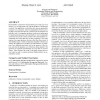Free Online Productivity Tools
i2Speak
i2Symbol
i2OCR
iTex2Img
iWeb2Print
iWeb2Shot
i2Type
iPdf2Split
iPdf2Merge
i2Bopomofo
i2Arabic
i2Style
i2Image
i2PDF
iLatex2Rtf
Sci2ools
124
click to vote
WWW
2004
ACM
2004
ACM
Shilling recommender systems for fun and profit
Recommender systems have emerged in the past several years as an effective way to help people cope with the problem of information overload. One application in which they have become particularly common is in e-commerce, where recommendation of items can often help a customer find what she is interested in and, therefore can help drive sales. Unscrupulous producers in the never-ending quest for market penetration may find it profitable to shill recommender systems by lying to the systems in order to have their products recommended more often than those of their competitors. This paper explores four open questions that may affect the effectiveness of such shilling attacks: which recommender algorithm is being used, whether the application is producing recommendations or predictions, how detectable the attacks are by the operator of the system, and what the properties are of the items being attacked. The questions are explored experimentally on a large data set of movie ratings. Taken t...
| Added | 22 Nov 2009 |
| Updated | 22 Nov 2009 |
| Type | Conference |
| Year | 2004 |
| Where | WWW |
| Authors | Shyong K. Lam, John Riedl |
Comments (0)

